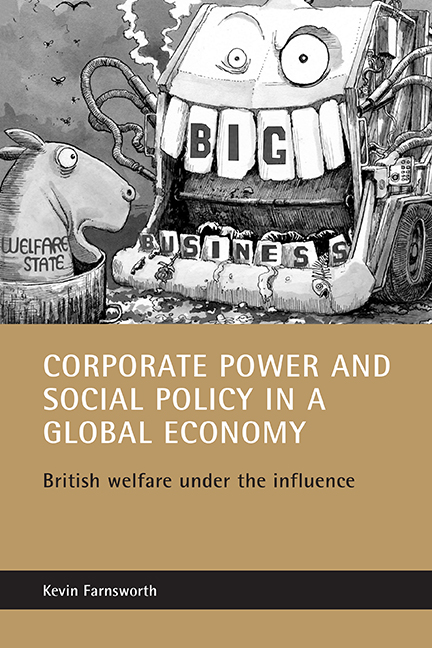Book contents
- Frontmatter
- Contents
- List of tables and figures
- Acknowledgements
- List of abbreviations
- one Introduction: globalisation, corporate power and social policies
- two Business and social policy
- three Globalisation, corporate structural power and social policy
- four Globalisation, Europeanisation, corporate agency power and social policy
- five The national level: business and social policy in the UK
- six Business and local welfare services
- seven The social policies of corporations: occupational welfare and corporate social responsibility
- eight Conclusion: corporate power and social policy in global context
- References
- Index
- Understanding welfare Social Issues, Policy and Practice
three - Globalisation, corporate structural power and social policy
Published online by Cambridge University Press: 20 January 2022
- Frontmatter
- Contents
- List of tables and figures
- Acknowledgements
- List of abbreviations
- one Introduction: globalisation, corporate power and social policies
- two Business and social policy
- three Globalisation, corporate structural power and social policy
- four Globalisation, Europeanisation, corporate agency power and social policy
- five The national level: business and social policy in the UK
- six Business and local welfare services
- seven The social policies of corporations: occupational welfare and corporate social responsibility
- eight Conclusion: corporate power and social policy in global context
- References
- Index
- Understanding welfare Social Issues, Policy and Practice
Summary
Much has been written on globalisation and its impact on the politics and economies of nation states. Politicians and the media regularly highlight its dangers and opportunities, while academics from most disciplines debate its significance and implications for their own fields of study. Today it is almost impossible to discuss contemporary social and political problems without reference to the impact of globalisation. Such has been the speed with which the notion of globalisation has come to dominate contemporary thinking that, to repeat Hay and Watson’s (1999, p 418) tongue-in-cheek assertion,
To have no opinion on globalisation is effectively to disqualify oneself from having anything to say about the way our world looks as we reach the millennium.
So, what is globalisation, and why is it important? For a term that has so caught the imagination, there is considerable disagreement surrounding its meaning and impact. As Yeates (1999, p 373) points out, globalisation is
a highly contested term whose frequent usage has obscured a lack of consensus with regard to what it entails, explanations of how it operates and the direction in which it is heading [and] is often used inconsistently, at times to describe trends, at other times to explain them.
At its simplest, globalisation refers to the dramatic increase in the flow of goods, services, economic stocks and information between people, firms and states, over increasingly large distances, since the 1970s. Political globalisation – the extension of political power and political activity across the boundaries of the nation state (Held et al, 1999, p 49) – is of growing importance as international and supranational governmental organisations such as the EU, the World Bank, the International Monetary Fund (IMF) and the World Trade Organisation (WTO) have increasing influence on governments. Although these organisations hold some relevance to structural power, however, their biggest impact is on corporate agency power (which is the focus of the next chapter). This chapter looks specifically at economic globalisation – the international growth of trade in goods and services and the increased movement of capital across borders – and its impact on corporate structural power which, in turn, has implications for social policy.
- Type
- Chapter
- Information
- Corporate Power and Social Policy in a Global EconomyBritish Welfare under the Influence, pp. 33 - 58Publisher: Bristol University PressPrint publication year: 2004



